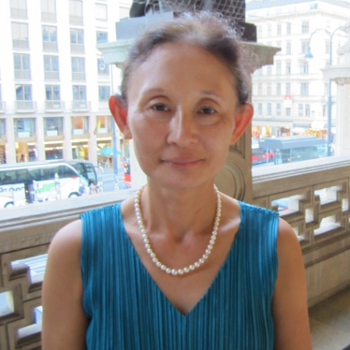“Turandot does not exist!” warn the three imperial ministers, Ping, Pang and Pong, as they tried to dissuade the unknown prince, Calaf, from pursuing his luck to win Princess Turandot by solving her three riddles. “Only the nothingness exists, in which you annihilate yourself!” These words in Act 1 may have inspired the director Philipp Stölzl to create an enormous puppet of Turandot, lifeless, yet dominant in his new production of Turandot at the Staatsoper Berlin. The puppet is the only prop on the dark stage with black cloth covering the back wall. Numerous strings attached to the doll are manipulated by supers, and its movements often occupy the audience’s attention to the detriment of the singing on stage.
On the plus side, the staging is simple with the chorus and supers moving about, sometimes enacting violence, under the shadow of the puppet. At times, a round platform rises up from the floor, looking like an uncovered cistern. Victims of Turandot’s brutal regime are thrown into this cistern; Turandot first appears here, underneath the puppet’s enormous dress. Other than Turandot, Calaf, Timur and Liù, all the performers are costumed in military uniforms inspired by China or perhaps another dictatorship in North Asia. There is some beautiful lighting (by Stölzl and Irene Selka) to create atmospheric abstract patterns of red, green and orange on the back wall.
At its best, Stölzl's new production gives us a new perspective on the plight of the ice princess as a lonely figure, where the story’s conventional happy ending proves too good to be true. As the opera progresses, the puppet – and Turandot – go through a metamorphosis. As Calaf, awestruck and fascinated by the giant doll, solves one riddle after another, the doll loses its long black hair and enormous deep green skirt. It is left with a bald head and a naked body. Finally its mask is removed to reveal a skull. The human Turandot suffers a less dramatic fate, but she too loses her hair and is finally stripped of her skirt by the three servants moments before a surprising ending. Abandoned by her people and betrayed by her servants, she is handed a bottle of poison as punishment for her past cruelty. She willingly takes the poison as Calaf sings his love to a large mask of the puppet on stage, not looking at the human Turandot. Only at the very end, as Turandot begins to weaken and collapse, does Calaf show her compassion; but it is too late. As Turandot cries out “Amor!” in vain and dies, Calaf mourns the demise of both his fantasy and reality.
Zubin Mehta, aged 86, exhibited remarkable control over this complex score, opting to emphasize the lyricism and sensitivity in Puccini’s last work, rather than its bombastic outbursts. At times, he slowed down the tempo so that melodies could be heard with clarity and delicacy. The sense of grandeur Mehta brought to the final moments of the opera, with the percussion joining in full force, was nothing short of thrilling.
While there were some last minute indispositions that resulted in the substitution of some minor roles, the singers and orchestra did not miss a beat to bring about musical coherence. Elena Pankratova is an experienced and consummate Turandot, and has the requisite power and steel for this demanding role. More remarkable was her beautiful, warm timbre that never diminished even when she rose to the height of Turandot’s exclamations. She varied dynamics to bring out a soft and vulnerable side of the ice princess, and her acting was both elegant and tender. Turandot is a relatively short role, but Pankratova made her both complex and fascinating.
As Calaf, Yusif Eyvazov's powerful tenor displayed ringing high notes and cut through the orchestra at the big moments. He had some issues with synchronizing his tempo with the orchestra and other singers, and was rather wooden in his acting. René Pape’s Timur failed to make a strong impression until his outburst of lament at Liù’s death. As Liù, Aida Garifullina looked lovely and sang with creamy legato; if only she could float her high notes to a delicate pianissimo! The trio of Ping, Pang and Pong was unusually articulate, distinct and interesting, as they were not a mere comic sideshow here, but rather active agents and instigators of the violence and cruelty. It was nice to see the 82-year-old Siegfried Jerusalem looking fit and singing the Emperor Altoum with energy.




